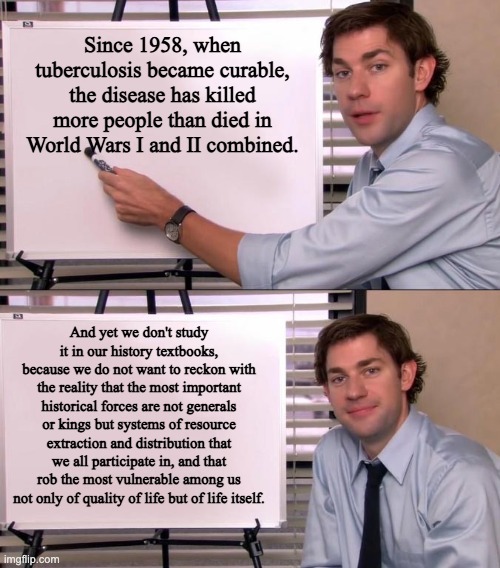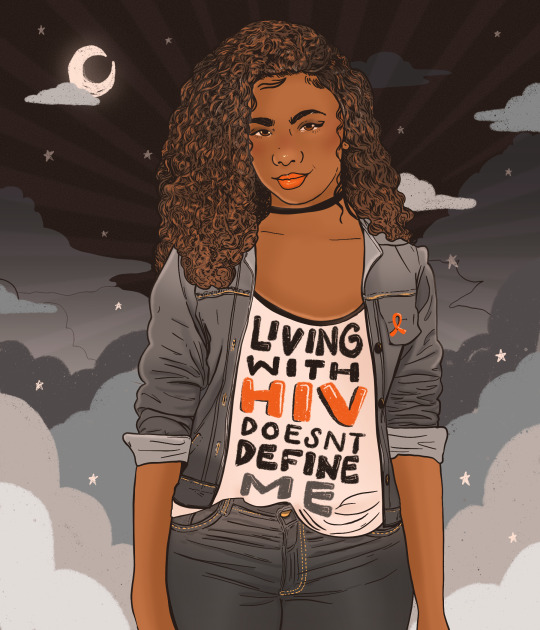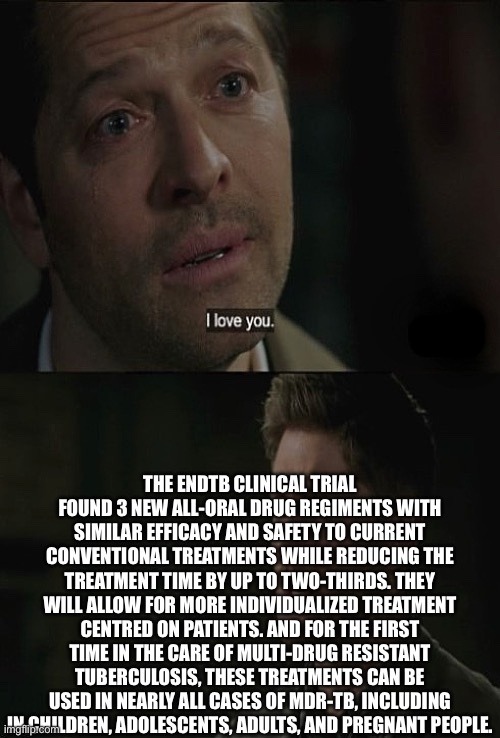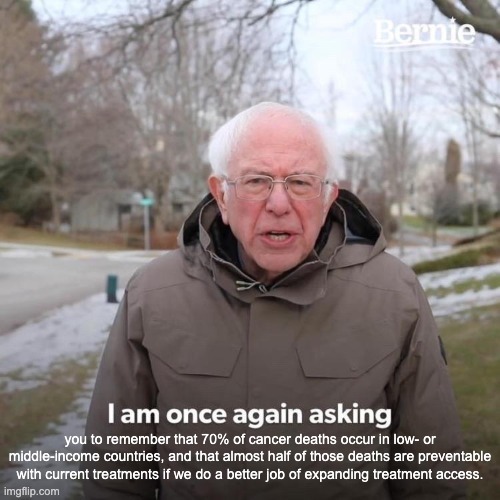#global health
Text

We celebrate the purported geniuses who discovered the cure--but we don't acknowledge that discovering a cure means nothing unless and until we get the cure to the people who need it--an enterprise we've failed at to a remarkable degree over the last 70 years.
24K notes
·
View notes
Link
Cancer
“Starting at home, a study last year found that US cancer deaths had declined by 33% since 1991. This is equivalent to around 3.8 million people alive thanks to various efforts to combat the disease family.
The report was authored by the American Cancer Society, and published in the journal CA. American Cancer Society CEO Karen Knudsen called the drop “truly formidable,” while the report attributed the fall to the development of better treatments, the reduction in smoking habits, and earlier detection methods.
Just between 2019 and 2020, cancer death rates dropped 1.5%, while the deployment of the HPV vaccine was correlated with a 65% drop in cervical cancer rates from 2012 through 2019 among women in their 30s.
The report also found that not only are death rates falling, but 5-year survival rates for detected cancers have increased 68% among all diagnoses made between 2012 and 2018.
Guinea Worm Disease
Cancer research often involves cutting edge medical research, but across West Africa and India where cutting edge medicine is not widely available, human determination has succeeded in nearly eradicating Guinea Worm disease.
There are records of this truly unpleasant parasite affecting human health going back thousands of years, and in 1989, there were nearly 1 million cases globally.
But in 2022, this unwelcome waterborne guest created just 15 cases worldwide—a decline of 99.998%, and almost all 15 of those cases occurred in Chad.
This monumental turnaround was not the result of some experimental vaccine, but simple education, teaching people how to avoid drinking contaminated water, when and where this mostly seasonal parasite is likely to be found, and how to treat water to purify it of the Guinea worm.
Ebola
Other than Chad, Guinea Worm disease was also found in Uganda, which produced another medical milestone with the successful eradication of a recent Ebola outbreak.
The outbreak began in September, driven on by the incurable Sudan strain of the virus. It was the worst outbreak in 20 years, but even though there is no vaccine for the Sudan strain, the health authorities managed to contain it to just two administrative districts, and 142 confirmed cases.
“The magic bullet has been our communities who understood the importance of doing what was needed to end the outbreak, and took action,” said health minister Dr. Jane Ruth Aceng Ocero last Wednesday.
Vaccine trials involving Oxford University are currently underway for the Sudan strain, but until that time, health authorities received congratulations for their swift actions, and were thanked for the “lessons learned.””
-via Good News Network, 1/19/23
#united states#africa#chad#uganda#cancer#cw cancer#infectious diseases#parasite#ebola#sudan#west africa#india#healthcare#disease prevention#global health#good news#hope
734 notes
·
View notes
Photo

Today marks #WorldAIDSDay, a time to show support for people living with #HIV and those who lost their lives to AIDS.
First commemorated in 1988, World AIDS Day raises awareness to end the spread of HIV and the stigma and discrimination that surrounds it.
Despite the progress made, HIV is still a major public health threat globally. In 2021, there were 1.5 million new HIV infections. In particular, girls in sub-Saharan Africa continue to be disproportionately affected by HIV, accounting for 63% of the region's new HIV infections in 2021.
However, it's important to know that in our modern era, people with HIV live long and happy lives thanks to access to antiretroviral therapy (ART). People living with HIV deserve care, not punishment.
To end AIDS, we must look and address underlying inequalities. Solutions include:
Increase availability of HIV testing, treatment and prevention (such as PrEP).
Reform laws and policies that perpetuate the stigma and exclusion of people living with HIV.
Ensure equal access to the best HIV science, between the Global South and North.
Collaboration with UNFPA
[Digital illustration of a Black fem with long curly hair. She’s wearing a white shirt that reads, “Living with HIV doesn't define me.” She’s also wearing gray jeans, a red ribbon and a black choker necklace. Behind her is a sky of gray clouds and a moon.]
#art#feminism#feminist#global health#HIV/AIDS#hiv#sti#sex ed#world aids day#aids#public health#health justice#feminist art
680 notes
·
View notes
Text

youtube
From TBFighters.org
Danaher - a large U.S. corporation - owns many smaller biotech companies, including Cepheid. Cepheid designs and manufactures diagnostic tests. Their TB GeneXpert test determines whether someone has tuberculosis and if the infection is drug resistant or not, enabling effective treatment.
Using the "printer ink" business model, Danaher sells the testing machines at a reasonable price, but WAAAY overcharges for the test cartridges themselves, especially the cartridges that show whether the type of TB someone has is likely to be drug-resistant, meaning that even when people can get a diagnosis, they may end up wasting valuable time on treatments that are less likely to be effective because they couldn't access the more advanced diagnostic cartridge, which, by the way, costs the SAME AMOUNT OF MONEY TO MANUFACTURER AS THE BASIC DIAGNOSTIC CARTRIDGE. Danaher is PURPOSELY price-gouging and it's costing thousands of lives a year.
But there's something we can do about it.
Contact Danaher and let them know to put #PeopleOverProfits and start selling their diagnostic cartridges for $5. It's #TimeFor5.
Danaher's corporate office: 202-828-0850
Email: [email protected]
Social Media: @DanaherCorp and @CepheidNews
For email, phone, and social media templates, (and more info and graphics to share) visit TBFIGHTERS.ORG
85 notes
·
View notes
Link
In a monumental milestone, UK Biobank has unveiled open access to incredible whole genome sequencing data for its over half a million participants. This vast genomic resource promises to massively accelerate the diagnosis, treatment, and prevention of diseases worldwide when combined with the study’s expansive health data. Dubbed a “veritable treasure trove” by Professor Sir Rory Collins, Principal Investigator, UK Biobank, the release cements the nonprofit UK Biobank as the most ambitious health research undertaking ever.
Genomic sequencing has revolutionized biomedicine by enabling the reading of the precise DNA code underlying human life. Technologies like PCR unlocked targeted gene testing decades ago. However, the affordable sequencing of entire genomes on a mass scale has only recently become feasible.
While costs have plunged, interpreting genomic data relies heavily on computational analytics. UK Biobank’s dataset amalgamates sequenced genomes from over 350,000 British volunteers with intricate health details like brain imaging, blood assays, lifestyle surveys, and more collected meticulously for 15 years. This unrivaled fusion promises tremendous leaps in illuminating genetics‘ role in disease.
Continue Reading
50 notes
·
View notes
Text

Midwife
“Village Midwife Rachel Yusufu (holding the baby), Mnyiramba, and Ayah Brim Masasi, Msukuma, weighing an infant and giving advice to the mother during an infant welfare clinic session at Kishapu Native Authority Dispensary and Clinic in Shinyanga District, Lake Province.” - via Wikimedia Commons
#midwife#midwifery#wikipedia#wikipedia pictures#wikimedia commons#healthcare#global health#neonatal care#pediatrics#history#medicine#medcore#medicalcore#medicore#medical#medical procedure#medical professionals#hospitalcore#hospitals#public health#healthcare professionals#healthcare provider#medical provider#Shinyanga Urban District#tanzania#medical clinic#medical history#nursing#nuresecore
14 notes
·
View notes
Text
Experts have been warning for years that factory farms are an ideal incubator for disease and make mutations far more likely - if we carry on farming animals as we are now (which we have to in order to meet anything even close to current levels of demand), the next zoonotic pandemic is a matter of when, not if.
145 notes
·
View notes
Text
‼️⚠️ 🎉 GOOD NEWS (nov. 15 / 2023)

[image ID: the destiel confession meme. cas says "I love you.
dean replies: "the endTB clinical trial found 3 new all-oral drug regiments with similar efficacy and safety to current conventional treatments while reducing the treatment time by up to two-thirds. they will allow for more individualized treatment centred on patients. and for the first time in the care of multi-drug resistant tuberculosis, these treatments can be used in nearly all cases of MDR-TB, including in children, adolescents, adults, and pregnant people."
end ID.]
multi-drug resistant tuberculosis (MDR-TB) is a form of tuberculosis that is particularly difficult to treat due to resistance to the 2 most powerful firstline antibiotics. many people are still treated with conventional treatments that are long (up to 24 months), ineffective, and often cause terrible side effects.
every year, there are about 500,000 new cases of MDR-TB worldwide - but only a tiny fraction are successfully treated. the endTB trial, led by MSF (médecins sans frontières/doctors without borders), PIH (partners in health) and IRD (interactive research and development), funded by Unitaid, and featuring 754 participants in 7 countries is a randomized, controlled trial designed to provide high-quality evidence on new, all-oral, shortened drug regimens.
one of the new regimens was found to be even more effective than current conventional treatments. the new trial also added an additional 4th regimen as an alternative for people who can’t tolerate some TB drugs.
there are now — for the first time ever! — 5 all-oral regimens that are effective against MDR-TB in 9 months or less and which are as good or better than a contemporary standard-of-care control. if recommended by WHO, they can be used in nearly all cases of MDR-TB, including children, adolescents, adults, and pregnant people, a first in MDR-TB care. two of the non-inferior regimens cost under $400, and a third costs under $600, for the full course of treatment.
EDIT: press release from endTB for a source
#tuberculosis#tb#endTB#good news#destiel#news#global health#MSF#doctors without borders#PIH#partners in health#people over profits#castiel#dean winchester#supernatural#public health#image id#described#health care#medicine#john green#vlogbrothers#social justice#IRD#interactive research and development#unitaid#médicines sans frontièrs#medicines sans frontiers#stoptb#pretend i posted this before midnight. the date was correct when i started it ok. today has bad personal health yet good global health
38 notes
·
View notes
Text
Not sorry but the anti-abortion loudmouths in positions of power in this country really will pull something out of absolutely nothing and try to make a point. PEPFAR is up for reauthorization at the end of the month and we STILL have to hear this "but some republicans are wavering" bullshit? Imagine being willing to destabilize a massive global health initiative bc "but what if the funds allocated to women's HIV health specifically are all rerouted to abortion :( that would make me as an out of touch white man sad :(" like from the bottom of my heart touch grass and grow the fuck up. You think anybody wants to hear anything from a group of people who still think HIV is a lifestyle disease and moral failing? What the fuck year is this? Throw your tantrum in a place w less collateral damage. Jfc.
17 notes
·
View notes
Text
Let's Talk Zionism And Anti-Semitism
There was a good post floating around earlier, but it's unrebloggable now. So, here's some common anti-Semitic rhetoric that's been floating around in anti-Zionist circles and how to tackle it!
1. Conflating anti-Semitism with anti-Zionism
Judaism is a religious belief, whereas Zionism is (usually) a political view that Jewish people have exclusive rights to the land of Israel/Palestine. It's worth noting there are other meanings and understandings of Zionism, particularly within the Jewish community, that are less blatantly ethnocentric. Those are absolutely subject to criticism as well, but those are mostly intracommunity discussions.
2. Claiming Jewish people should simply "go back home" or be deported.
Jewish people have a legitimate claim to Palestinian land. There was an extant, peaceful Palestinian Jewish community in that region prior to 1948. If the Israeli occupation ends, it's possible many Jewish Israelis will choose to leave Palestine, but it's also likely many will choose to stay and help build a more equitable society.
3. Insisting Jewish people must talk about Zionism before discussing anti-Semitism
This gets tricky! All people in positions of privilege (those of us who are White/non-Black and Indigenous, Western-born, middle class, etc.) have an obligation to speak out against the oppression of those without those privileges. This includes an obligation for American Jews to speak out against the oppression of Palestinians. That said, not every conversation is going to be about the Israel-Palestine conflict, and that's okay. Anti-Semitism and Islamophobia are intrinsically tied. Muslim and Jewish communities need to stand in solidarity with each other, and that includes holding space and time for dismantling anti-Semitism within anti-Zionist spaces. No one is free until we're all free.
4. Holocaust denial/ignorance
It's worth reading up on the history of the Zionist movement! The U.S. (and essentially all other countries) were complicit in the Holocaust, and this precedent fuels the fears of many Jewish people who think Israel is the only thing preventing another Holocaust. White supremacy plays on this fear to pit minoritized groups against each other.
5. Identity Politics
No group is monolithic! We should be analyzing our positionality, but simultaneously it's important to understand that every group is comprised of diverse individuals with widely varying opinions. That includes me! I'm speaking as an ethnically and religiously Jewish person of color, an American, and as a queer person. Those positions and experiences certainly influence my views, but at the same time, you can 100% find people with exactly those identities who have very different opinions. Be wary of anyone who claims that they alone speak for the Jewish community. The way around this is to interact with lots of Jewish people (especially Palestinian Jewish people!) What views seem to be common? Who seems to have good points?
#free palestine#jumblr#anti zionisim#history#politics#politics are public health <3#no racist clowning thx. I'm just gonna block you#global health#violence
10 notes
·
View notes
Link
The chief of the World Health Organization says the expanding monkeypox outbreak in more than 70 countries is an "extraordinary" situation that now qualifies as a global emergency, a declaration on Saturday that could spur further investment in treating the once-rare disease and worsen the scramble for scarce vaccines.
WHO director general Tedros Adhanom Ghebreyesus made the decision to issue the declaration despite a lack of consensus among members of WHO's emergency committee. It was the first time the chief of the United Nations health agency has taken such an action.
"We have an outbreak that has spread around the world rapidly through new modes of transmission about which we understand too little and which meets the criteria in the international health regulations," Tedros said.
Continue Reading.
218 notes
·
View notes
Text

(I learned this from Hank.)
#global health#tuberculosis is not the only health problem#the real health problem is inadequate access to treatment#and fragile healthcare systems#the world's leading cause of death is impoverishment#hank green
4K notes
·
View notes
Note
I’m scared, and I’m sad. I look at positive news every day, but sometimes things happen that make me derail. What can I do?
It's natural to be scared and sad about this stuff. We live in a world that gives us more information about more people than we were ever designed to handle. And a lot of that information is about really upsetting, tragic, or horrific things.
What I try to do whenever I start to feel like I'm falling into despair, I try to remember to take a long view of history.
Change isn't often visible in the short term because change is so chaotic. But in physics - and I would argue therefore for organisms and humanity as well - chaos at the micro level creates stability at the macro level.
The fact is, statistically, this IS the best time to be alive. It really doesn't feel like it a lot of the time, but it is.
But a lot of things still suck, and sometimes it feels like all the reasons in the world are slipping through your fingers. It can be very easy, sometimes, to give into the despair in the face of all the things humanity has done, to ourselves and to each other.
Here's the one fact I hold on to with all my strength, when all else fails. The one thing that is too powerful to slip through my fingers:
For almost all of human history, until the past roughly 200 years, the child mortality rate was about 50%.
Sure, it varied based on location and century and the hygiene practices of the dominant culture. But overall, it was about 50%, with child morality defined as any infant or child who dies before their 15th birthday.
That means that half of all people born died before their 15th birthday.
Most of human history, as famous journalist and nonfiction author Bill Bryson puts it, was "overwhelmingly a place of tiny coffins."
Imagine how fucking awful that would be to live with. Imagine all the extra grief and pain and suffering flooding the world.
That fact alone basically guarantees that ever single person who ever lived, until very, very recently, was traumatized, or died before they could be. And that's leaving out the rampant trauma of famine, nonfatal disease, exposure, violence, and everything else that can come from a lack of resources or just the brutal vagaries of nature.
But we don't live in that world anymore. We live in a world where we have reduced child mortality from 40% to 3.7% in just two hundred years.
And those rates are going to keep falling as developing nations with higher child mortality rates get access to better infrastructure, medical care, and resource distribution.
So this is what I cling to, when I can cling to nothing else: no matter how bad things are, no matter how much technology fucks things up, technology and progress have freed us from the hell of half of all our children dying.
We have already done so, so much to free ourselves from one of - if not the - absolute worst curses of human existence
The world has improved so, so much more that most people can even imagine - more than our ancestors could have ever expected - just from that one fact. In just a couple of centuries.
What isn't that worth? Very, very, very little, I'd argue.
The challenges we're facing are formidable. Just a few years ago, they looked insurmountable. From child mortality to climate change, we still have so much more to do.
But if we can save ourselves and our children from a mortality rate that was, for almost all of human history, an inevitable part of the human condition...
Then what can't we do? What won't we be able to achieve, in the end?
Again, I'd argue: very, very, very little.
#toastedsmoreo#ask#hope#hope posting#child mortality#cw child death#cw death#cw infant death#children#infants and toddlers#public health#global health#progress and development#good news#hopeposting#hopepunk#faith in humanity#me#advice
144 notes
·
View notes
Text
Dropping this link just in case anyone else needs to hear about the good things and all the progress made in 2023 that wasn't widely reported.
11 notes
·
View notes
Text
Dengue Outbreak in Bangladesh
Coverage from the NYT on the ongoing Dengue outbreak in Bangladesh:
10 notes
·
View notes
Link
Typhoid, once a disease that ravaged countries, had been considered tamed by the introduction of new antibiotics in the mid-20th century. Awareness of the importance of sanitation and hygiene also rose as literacy and higher education rates increased; however, the rise of multidrug resistance in various typhoid strains has become a cause for concern. A new consortium, the Global Typhoid Genomics Consortium, has now been formed to further our understanding of antimicrobial resistance in typhoid in different countries and regions. Enabling policymakers to make decisions utilizing genomic data from disease surveillance may make it easier to plan for disease outbreaks and treatment.
Salmonella Typhi, commonly referred to as Typhi, is the causative agent of typhoid fever, which, if left untreated, can be fatal, with mortality ratios estimated to be less than 1% in modern times but ranging from 10% to 20% in the pre-antibiotic era. Historically, the disease has been responsible for deaths on a mass scale, usually triggered by the prevalence of unhygienic conditions, as urbanization and industrialization led to overcrowded cities and unsafe living environments. While the situation has mostly improved in many parts of the world due to significant improvements in water, sanitation, and hygiene infrastructure, it is still responsible for more than 10 million infections, as well as more than 100,000 deaths annually. A large number of these deaths were in low-income countries, with patients often having less access to clean water, food, and hygiene infrastructure.
Salmonella was one of the initial pathogens to undergo sequencing in high-income countries. Public health laboratories often identify Typhi strains from patients and carriers, which serves as an informal method for monitoring the genetic makeup of pathogenic populations in countries with a high prevalence of the disease. More recently, whole genome sequencing (WGS) was utilized for disease surveillance in both endemic and non-endemic countries.
Continue Reading
37 notes
·
View notes